Is Sugar Vegan? This is one of the most commonly asked questions in the vegan community. What makes sugar NOT vegan-friendly and how do we find vegan sugar? Here is the break down of sugar that every vegan should know.
Disclosure: This post may contain affiliate links.
Inevitably, after posting a flourless chocolate cake or chewy vegan brownies, my inbox gets peppered with a few emails asking about sugar.
Is sugar vegan?!
The answer is yes, but not always. Because it's complicated, and not necessarily something you can figure out easily, I decided it was time to put together a comprehensive guide that answers the question once and for all.
Different Types of Sugar
When we are talking about whether sugar is vegan or not, we are specifically talking about refined sugar, aka, table sugar. That is the sugar we most commonly used in baking. White, brown, and powdered sugar all can classify as refined sugar. Refined sugar comes from two sources: sugarcane and beets.
While the two sugars are very similar in taste and texture, the refining process from these sources is very different. The good news is that beet sugar is ALWAYS vegan. The process of making sugar from beets simply does not require the same level of processing.
Hooray!
However, cane sugar, traditionally the more common option, is where things get a little tricky. When asking about refined cane sugar, the answer would be, "sometimes."
What makes sugar not vegan?
Let's start with why some sugars are not considered vegan. To make refined sugar from sugarcane, the sugar cane stalks are crushed to separate the juice from the pulp. The juice is then processed, filtered, and bleached with bone char. That pure white color we associate with sugar - yeah, that comes from the bone char.
Now it's important to note that this type of sugar does not actually CONTAIN bone char. But because it is part of the process, most vegans would not eat this kind of refined sugar.
Now I've got more good news. Not all refined sugars practice this unnecessary bone char process. Yes, my friends, vegan sugar is everywhere!
How to Tell if Sugar is Vegan
Sugar that comes from sugar beets is considered vegan; the process does not involve bone char. The brand of beet sugar I often use is this one from Now. (<<affiliate links) Beet sugar has virtually the same taste and texture as cane sugar; the difference between the two is negligible.
If you want to stick with cane sugar, sometimes you'll find brands that will actually say vegan but most are not certified vegan and therefore, cannot advertise that.
Here are a few other words that you can look for to feel confident that your sugar is, indeed, vegan:
- Organic
- Unrefined
- Natural
- Raw
When a label uses any of these adjectives, you can rest assured that it has not been filtered with bone char. In the organic practice, the sugar cane juices are boiled, spun in a centrifuge, and dried into sugar crystals. These sugars are not as pure white but can be substituted in any recipe.
Best Vegan Sugar Brands
The following links contain affiliate links. That means I get a small commission if you purchase through my link at no extra cost to you. For more information please see my privacy policy.
There are many options for vegan sugar. This is my favorite brand. Not only is it vegan but it's GMO-free and fair trade. (Fair Trade is incredibly important in the sugar industry. I'm not going to get into that here, but you can read all about it here.)
Wholesome! products bake and cook exactly as one would expect sugar to and they also carry brown sugar and powdered sugar, too!
A few other vegan sugar brands to look out for:
- Big Tree Farms
- Bob’s Red Mill
- Florida Crystals
- In the Raw
- Now Foods
- Rapunzel
- Simply Balanced
- Simple Truth
- Trader Joe’s
- Wholesome!
- Woodstock Farms
Healthier Sugar Alternatives
Many people choose to avoid refined sugar for health reasons. I believe in the benefit of avoiding refined sugar and respect those who do. For those of you who want to avoid refined sugar altogether, here are some sweetener alternatives.
- Date Sugar - To replace white sugar with date sugar, substitute with a 1:1 ratio
- Maple Syrup -To replace white or brown sugar, substitute ¾ cup of maple syrup for each cup of white or brown sugar. Reduce liquids by 3 tablespoons for every cup of maple syrup.
- Dates - To replace make a date paste by puréeing dates in hot water to form a thick paste. Substitute 1 cup date paste for 1 cup of sugar.
- Coconut Sugar - To replace brown sugar with coconut sugar, substitute with a 1:1 ratio
- Stevia -In baking, substitute ½ teaspoon of undiluted stevia powder or 1 teaspoon of a liquid stevia extract for each cup of sugar.
- Monk Fruit - In baking, substitute 1 teaspoon monk fruit sweetener for each cup of sugar.
- Brown Rice Syrup - Substitute 1 ⅓ part Brown Rice Syrup for brown or white sugar. Reduce liquid 3 tablespoon per cup of sugar.
- Agave Nectar -Substitute ⅔rd cup agave for every 1 cup of sugar. Reduce the liquid in the recipe by 3 tablespoons per cup of sugar.
Please note, these are merely guidelines. When replacing sugar with natural sweeteners, the recipe will likely require additional tweaking.
TLDR; Is sugar vegan?
- Beet sugar is always vegan
- Cane sugar, when labeled organic, natural, raw, or unrefined is also vegan
- Avoid granulated refined sugars that do not mention any of the above adjectives
- When avoiding refined sugar altogether, there are many sugar alternatives.
Vegan Desserts to Try
Now that we've established that sugar can be vegan, we can start baking! Let's take a look at some vegan desserts worth trying.
- Ginger Molasses Cookies
- Classic Chocolate Chip Cookies
- Vegan Chocolate Cupcakes with Chocolate Buttercream
- Vegan Lemon Bars
- Gluten-Free Vegan Carrot Cake
- 5-Ingredient Coconut Milk Ice Cream
- Vegan Molten Lava Cake
Get all my vegan dessert recipes here.
Written by Sarah McMinn
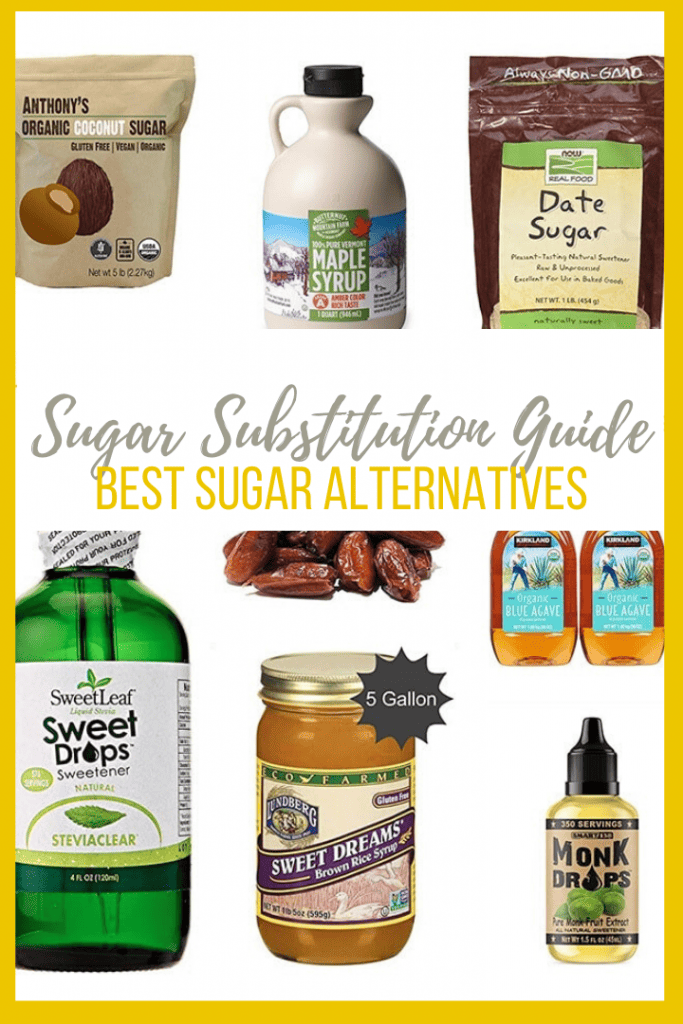
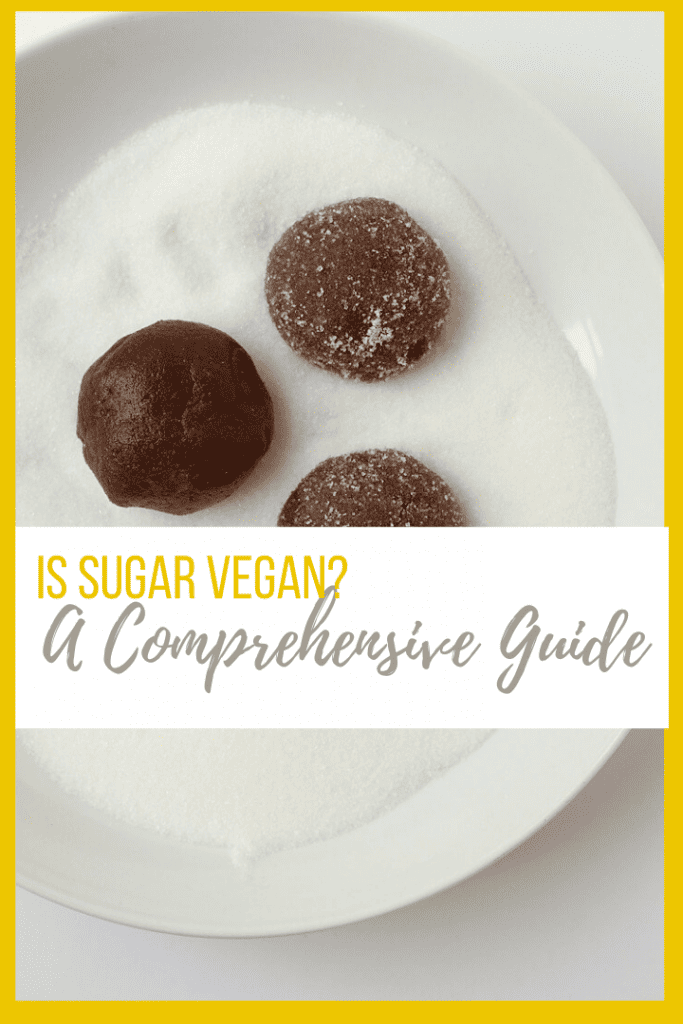
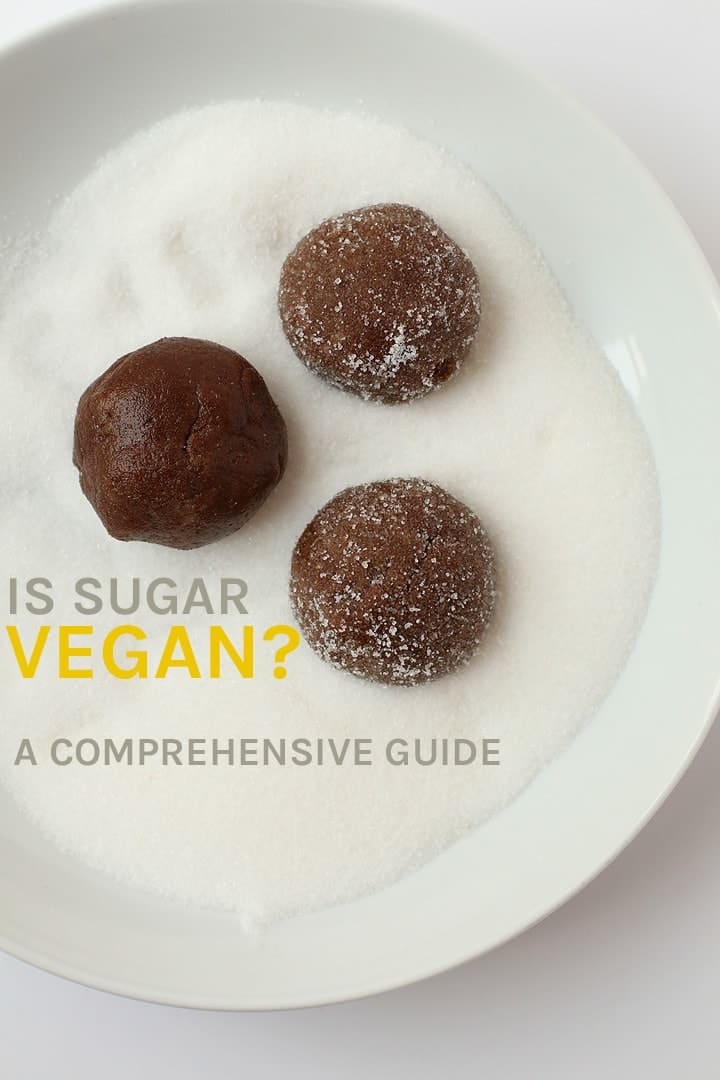
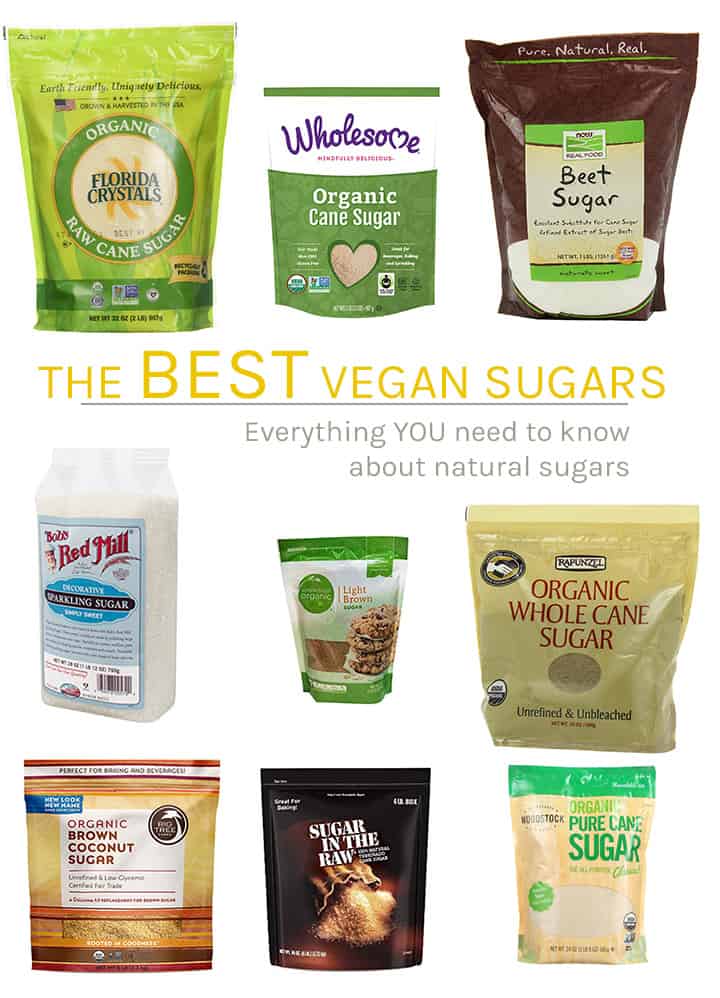
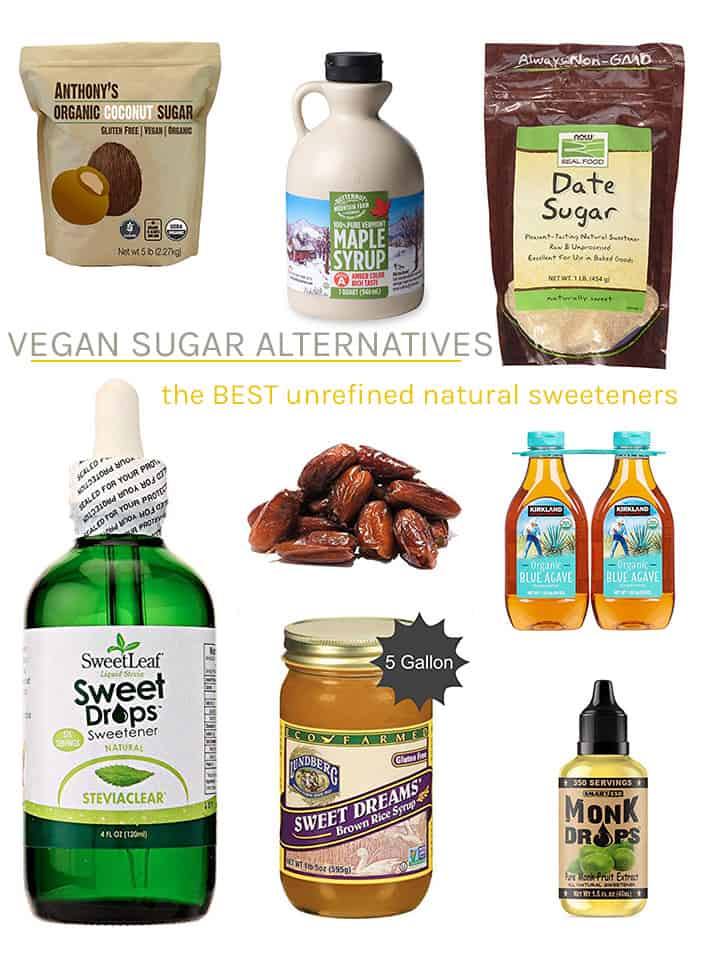
 Hi, I’m Sarah. I’m a 14-year (and counting) vegan, professionally trained photographer, former pastry chef, founder of My Darling Vegan, and author of the
Hi, I’m Sarah. I’m a 14-year (and counting) vegan, professionally trained photographer, former pastry chef, founder of My Darling Vegan, and author of the
Loretta Reust says
Why do vegans avoid honey? I know honey comes from bees, but bee keepers take care of bees. (My brother-in-law is a bee keeper.) It seems like there are several reasons to eat vegan, 1. to avoid harm to animals, 2. for personal health 3. for planet health. Honey has many benefits for health, such as natural antibiotic properties, and some studies seem to indicate that local honey is good for seasonal allergies. We want to encourage the growth of our honey bee population, and bee keepers do that. Bees are necessary for the health of our crops and our environment. It seems like we can do a good thing by promoting vegan diet with honey as a natural sweetener.
Lea says
I think some of the need get killed when getting honey out. I joe some are better than others. I’m getting honey from the reservation. I didn’t eat it but do some now that’s it’s local.
Lea says
I meant some bees get killed. Oops! And not joe but know ! I need to edit!
Rohan Forbes says
I appreciate your information didn't know so much i am a vegan for 23 years now
Timothy Kelleher says
Hello!
Thank you for your terrific website!
This summary of sugar is very helpful. I have a question though, and wonder if you might know the answer: when it comes to commercial products - from cereals to cookies; bread to beer, etc - is there any way to know if the sugar listed among the ingredients is filtered with bone char? (ie, other than it being listed as organic or raw).
Any information would be greatly appreciated.
Thank you again for your wonderful site!
?,
tim
Sarah McMinn says
That's a tough one! The only way to know for sure that it's vegan sugar in those foods is if the sugar is labeled as organic. Or you can contact the brand and ask if their product is vegan. I hope this helps!
Yalda amiri says
Hi there ,
I'm vegan and i want to know which sugar is vegan and which one is not and also some of the food like one of the Kimchi Noodle soup that i love the ingredient say sugar and i would love to hear from you.
Tricia Berkow says
Hi! Regarding your Monk Fruit substitution for the refined sugar....Is it really 1 teaspoon of Monk Fruit for 1 cup of sugar? Wow...that’s a huge difference. I guess I’ve putting in way too much. I was doing a 1:1 ratio?
Mitchell says
Hi, I think you are confused about what makes things vegan/not vegan. Bone Char is used as a filter to remove impurities from the sugar. It’s basically the same as rubbing an apple on a cow and then saying the apple is no longer vegan. You are not actually consuming an animal product, yet actually the opposite, the Bone Char is REMOVING Things from the sugar. You aren’t actually eating any of the Bone Char.
Sarah says
Yes, I know you aren't eating any of the bone char, as stated in the article. However, anything that uses animal products or byproducts in the food as an ingredient OR in the process of creating the food is NOT considered vegan. While some vegans choose not to worry about this, the definition of veganism would exclude these types of foods from one's diet.
Renee E. says
That’s true. Vegans who care about animal cruelty and/or the environment don’t choose to financially support any company that uses any animal product. They don’t buy leather products either, or cosmetics that have animal ingredients or are tested on animals. It’s kind of a boycott of animal agriculture in general. Hope that makes it more understandable.
François says
The problem is the cow have to be kill to be able to use the bone .
Vegan don’t believe in killing animal to eat or to use their products
Detravious Brinkley says
Thank you so much for this article. You have clarified my confusions of sugar for vegans!